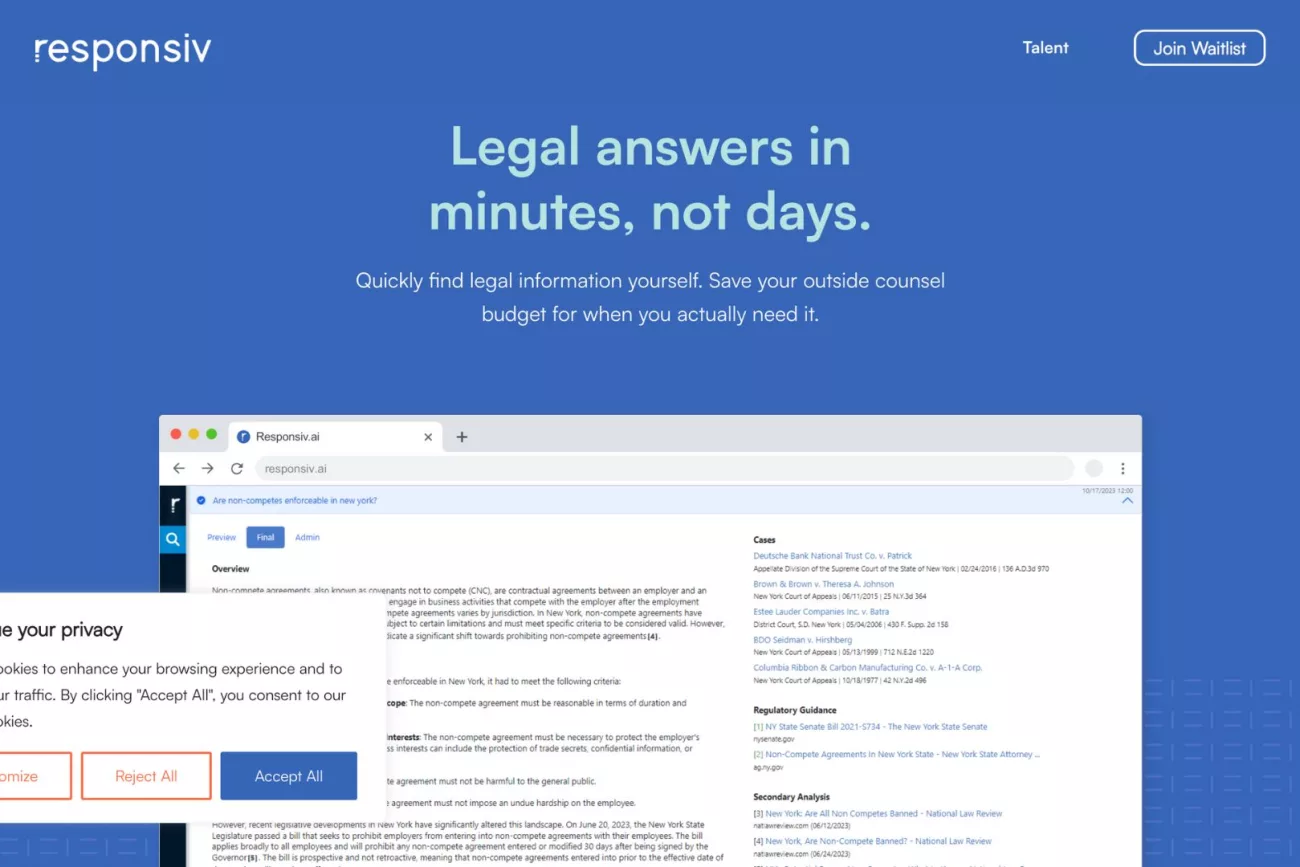
Key Points
Legal Tech Evolution: The article emphasizes the critical importance of legal technology in modern law practice, highlighting how it has become indispensable for efficiency, accuracy, and client satisfaction.
Signs of Outdated Tech: It outlines key indicators that legal research software and other technologies need upgrading, such as inefficient research methods and doubts about the accuracy and quality of work.
Impact of Remote Work: The article discusses how the shift to remote work has made flexible and advanced legal tech tools more crucial than ever for effective legal practice.
Client Satisfaction and Business Success: It asserts that embracing modern legal technology is essential not only for improving client satisfaction but also for ensuring the competitiveness and success of a law firm.
The Revolution of Generative AI in the Legal Sphere: A Groundbreaking LexisNexis Survey Unveiled!
Key Points: Generative AI is transforming the legal profession, offering solutions for legal research, document
Meta’s Bold Leap: Luring Youth with AI Bots!
Explore Meta’s adventurous foray into AI chatbots with personalities! Uncover the challenges, prospects, and the
Breaking: New York City Shakes Up AI Hiring with Game-Changing Regulations!
NYC A New Era in AI Hiring Regulations New York City has recently taken a
🚀 The Legal Tech Revolution: Navigating the Upgrade Jungle 🚀
Riding the Legal Tech Wave or Drowning in Obsolescence?
In the fast-paced, ever-evolving world of legal technology, staying afloat isn’t just about keeping pace with competitors; it’s about survival and dominance in an increasingly digital legal landscape. As Mark Frongillo from Thomson Reuters insightfully points out, “The problems haven’t changed, but the tools have.” The question is, are your tools cutting-edge champions or dusty relics in the archive of legal history?
The Legal Tech Upgrade Dilemma: To Leap or Not to Leap
- The Old School Approach: Gone are the days when ‘the lawyer down the hall’ was your oracle for quick legal wisdom. In today’s remote work era, that colleague is likely miles away, nestled at their home desk. This shift isn’t just geographical; it’s a signal of a broader transformation where physical proximity gives way to digital immediacy. How does your firm bridge this gap?
- The Burnout Indicator: Consider the case of a mid-sized law firm in New York City where attorneys spent countless hours manually sifting through case law, leading to increased stress and decreased efficiency. This isn’t just a productivity issue; it’s a health hazard. The time sink in traditional research methods is an express lane to Burnoutville. Modern legal tech, however, offers an oasis – tools that streamline research, reducing hours to minutes.
The Capacity Crunch: Turning Away Work is Turning Away Success
- The Demand Surge: Imagine a scenario where a sudden influx of corporate clients overwhelms a firm’s outdated legal tech infrastructure. This isn’t just an inconvenience; it’s a missed opportunity. In a profession where agility is key, if your technology can’t keep up with surging client demands, you’re not just losing business; you’re surrendering your competitive edge.
- The Organizational Maze: There’s a thin line between being thorough and being lost in the data deluge. If you find yourself trapped in a cycle of endless re-research and disorganized data, your technology is more of a labyrinth than a lever. Advanced legal research tools, like AI-driven data analysis, turn this maze into a clear, navigable path.
Knowledge Handoff: Passing the Baton or Dropping the Ball?
- Retirement Roulette: Take the case of a veteran attorney in Chicago whose retirement left a chasm of lost expertise. This isn’t just about losing a colleague; it’s about losing a treasure trove of knowledge. In the legal realm, the transition of knowledge is as crucial as the knowledge itself. How does your firm ensure that the wisdom doesn’t walk out the door with retirees?
- The Courtroom Confidence Crisis: There’s no worse feeling than second-guessing your preparation as you step into the courtroom. It’s like showing up for a duel with a blunt sword. If your legal research tool is a source of doubt rather than assurance, it’s time for an upgrade. Advanced legal research software offers comprehensive, up-to-date information that can bolster your confidence and fortify your arguments.
The Flexibility Factor: Adapting to the New Legal Landscape
In a profession that’s historically been synonymous with long hours at the office, the seismic shift towards remote work has revolutionized how legal work is done. But this change isn’t just about where you work; it’s about how you work.
- Remote Work Revolution: Consider a recent case at a San Francisco law firm. After shifting to a remote-first model, they found that 44% of their young lawyers were more engaged and productive, thanks to flexible work arrangements supported by robust legal tech. This isn’t an isolated trend; it’s a clarion call. In a world where a significant portion of young lawyers prioritize flexibility, clinging to archaic systems can render your firm obsolete. Legal technology today isn’t just a tool; it’s the very foundation of a modern, agile legal practice.
- The Accuracy Anxiety: Let’s take the example of an attorney preparing for a high-stakes intellectual property case. After hours of manual research, a nagging doubt lingered: had she missed a crucial precedent? This is where advanced legal research tools come into play. They’re not just about accessing information; they provide a precision-guided approach to research. These tools, equipped with AI and machine learning, don’t just find information; they find the right information, ensuring that your research is comprehensive and accurate. This isn’t just about peace of mind; it’s about being thorough and precise in a profession where details matter.
Client Confidence: Are You Their Legal Superhero?
In a legal market where clients are more informed and discerning than ever, the expectation isn’t just competent representation; it’s exceptional service that provides real value.
- The Quality Quandary: Imagine a scenario where a client is facing a complex merger. They’re not just looking for any legal advice; they’re looking for insightful, strategic guidance that can navigate the intricacies of corporate law. If your research tools are outdated, your advice might not just be subpar; it could be detrimental. In today’s legal market, your advice shouldn’t feel like a roll of the dice; it should be a calculated, well-researched strategy.
- Tech to the Rescue: Picture legal research tools as your digital mentor, akin to a ‘legal Yoda,’ offering wisdom and guidance. These tools, with features like interactive matter maps and AI-driven research, don’t just streamline your workflow; they elevate your practice. They allow you to tackle complex legal issues with confidence, turning you into a legal superhero in your clients’ eyes.
The Verdict: Is Your Legal Research Software a Fossil or a Futurist?
The legal industry is at a crossroads, and your choice of technology will determine your path. If you’re encountering any of the signs mentioned, it’s not just a suggestion to upgrade; it’s an imperative.
Don’t Just Keep Up, Stay Ahead
In an industry that’s rapidly evolving, staying current with the latest legal tech tools isn’t a luxury; it’s a necessity. The question isn’t just about keeping up; it’s about leading the charge.
🔥 The Future is Now: Embrace the Legal Tech Revolution 🔥
The future of legal practice isn’t on the horizon; it’s here. Now is the time to embrace this revolution. Upgrade your legal research software and step boldly into a new era of legal practice where efficiency, accuracy, and client satisfaction aren’t just aspirations; they’re your new reality.
Share this post
Frequently Asked Questions (FAQs)
Q: Why is legal technology important in modern law practice?
A: Legal technology is vital for enhancing efficiency, accuracy, and flexibility in legal work. It allows lawyers to stay competitive and meet the evolving demands of clients in a digital age.
Q: What are the signs that my legal research software needs an upgrade?
A: Signs include reliance on outdated research methods, feeling overwhelmed by the volume of work, struggling with organization, doubts about research accuracy, and concerns about providing the best advice to clients.
Q: How does remote work affect legal technology needs?
A: With the rise of remote work, legal technology that supports flexibility and collaboration is essential. Firms need tools that enable lawyers to work efficiently from anywhere.
Q: Can legal tech improve client satisfaction?
A: Absolutely. Advanced legal tech tools provide more accurate and comprehensive research, helping lawyers offer insightful, strategic advice, thereby increasing client satisfaction.
Q: Is investing in new legal tech a wise decision for law firms?
A: Investing in the latest legal tech is crucial for law firms to stay relevant and competitive. It’s not just a wise decision; it’s an essential strategy for future success















